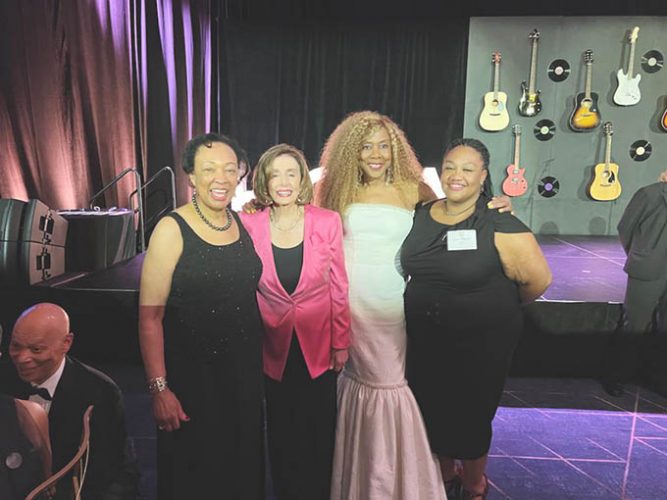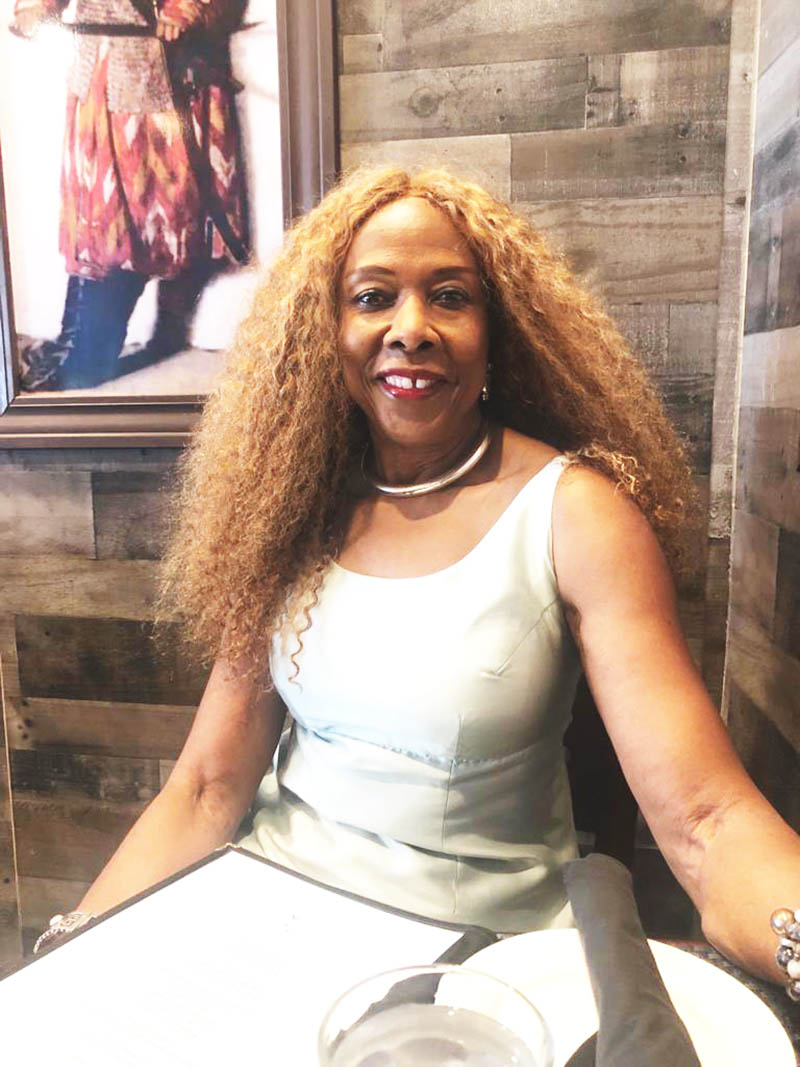Rosemary Kilkenny believes that the work she has been doing at her alma mater – Georgetown University in Washington DC, USA, where she is the first Black woman to have been elevated to a leadership role – on ensuring that there is inclusivity the university’s faculty and staff is impactful and that success is due to the “significant grounding” she had in Guyana as a child.
Kilkenny was in fourth form at the Bishops’ High School when she left Guyana. Her parents, the late James and Joyce Kilkenny, were Guyanese schoolteachers and as a result her entry into the world of higher education, albeit in a totally different dimension to that of her parents, was no surprise.

“They always instilled in us the value of education and that my sister and brother and I would have been university graduates. It was always assumed that we would pursue higher education,” Kilkenny said of her parents in a recent sit down.
Her area of work was also motivated by the fact when the bright-eyed, teenage girl from Guyana landed in America, it was at the height of the civil rights movement, desegregation of schools, calls for more black people to be accepted as university students, to have better jobs, economic opportunities and housing.
Martin Luther King Jnr was assassinated when she was a freshman at college and with the activism being maybe at one of its highest points, Kilkenny said, she “got caught up in that… and that is pretty much how I got into it. The whole mood of the United States was civil rights. Civil rights with a focus pretty much on racial equality.”
Her father had received his master’s degree in education and curriculum development and he assumed, “I think wrongfully so,” she said, that she would follow in his footsteps. Instead, she chose a somewhat different path, going to law school at the Georgetown University Law Center, where she got her doctorate of jurisprudence degree.
She later became the university’s inaugural vice president for Institutional Diversity, Equity and Inclusion in 2006. She was further elevated to the role of Vice President, Diversity, Equity, Inclusion and Chief Diversity Officer for the university’s four campuses, including the one in Doha, Qatar.
Today, this woman of Guyanese soil supervises the Office of Institutional Diversity, Equity and Affirmative Action and the Title IX Office. While she has spent a significant portion of her professional life at Georgetown, she also held administrative and executive roles in affirmative action, educational equity and access at Kent State University and the State University of New York’s Albany campus.
Her journey to where she is today started as a student at the Kent State University, where she was always active in student politics and at that time it was evident to her that the black people who were in graduate school and had received graduate fellowships during that time were from foreign countries. While she lived in the US, she was not a citizen at the time. The other Black students were international students and they took up the issue with the dean as to why there were no African Americans at the school.
Ultimately, the job of fixing this fell on Kilkenny’s shoulders as she was given a position to recruit black Americans to the university.
“I would say all of my career really and the most significant contributions that I feel that I have made have been at Georgetown…,” Kilkenny said. Nevertheless, she will soon be honoured by Kent State for the work she started at that university and where she is today.
No more than five or six
Chronicling her work at Georgetown and why she believes it has been the most impactful, Kilkenny shared that when she started at the university there were no more than five or six Black professors at the main campus and only one was on tenure track – a process by which an assistant professor becomes an associate professor and then a professor.
Since her arrival, the representation of blacks on the staffing has risen, especially at the Law Center and the Medical Center campuses.
“I would say the major impact I have had has been in the significant increase of black members in our faculty, establishing policies and procedures that required academic departments to be more aggressive in recruitment and outreach to employ more black professors and along with that more black staff as well…,” Kilkenny said.
From a legal standpoint, because Georgetown, like other universities, has benefitted from federal funding, it is required to have an affirmative action plan to examine the demographic profile of its employees in each of the employment categories.
Since the university is located in Washington – the seat of the federal government – it came under scrutiny and was found wanting as it was deemed out of compliance with the federal mandate of the affirmative action plan. Kilkenny was specifically hired to establish an affirmative action plan with goals and timetables for increasing the representation of women and minorities, inclusive of Blacks, Asians, Hispanics, and Native Americans.
That plan had to be presented to the United States Department of Labor for approval and with her drive saw the increase in the hiring of Blacks, Latinos, Asians and women faculty members.
“I would say that has been the biggest accomplishment as well as putting in place institutional policies that create a climate to make it possible for not only hiring those individuals but making sure that we create an environment so that they can be successful and would stay and then rise up through the ranks at the university,” she shared.
In walking this path, Kilkenny, being the first and still the only black woman in such a position at the university, felt as if she was always under a microscope and shared, “to this day I am probably the most visible person on campus”. Of course this stems from her role, but she also believes it is because of how she looks, conducts herself and even her demeanor and physical stature.
Having to work harder and prove herself are among the potholes in her journey but she managed to overcome those along with sexism and racism which she also faced. She has now achieved a certain level of credibility, but she pointed out that it took a long time to get to there.
She gave the example of being wrongly identified as a staff of a faculty restaurant by a faculty member, noting that many times a white person only sees the colour of one’s skin and “things like that serve to deflate who you are”.
But those hurdles made Kilkenny more defiant and she used them as a method to do more and be more aggressive in getting her message over as there are always pockets of people who will resist because it is “a very racist society or you wouldn’t have the need for affirmative action”.
Following the death of George Floyd, who was killed when a now convicted White police officer knelt on his neck until he stopped breathing, Kilkenny said, the university went through a significant assessment on the extent to which members of the community felt welcome, valued and expected.
This was done in 2020 and the results showed that significant representation of black students did not feel welcome and valued. Now, armed with the empirical evidence, they are on a crusade to do more and this has seen the establishment of the University Leadership Council Academic Diversity Equality Inclusion and Racial Justice Initiative. Steps are being put in place to address specifically what the students criticised and one of the areas that is being tackled is curriculum transformation as students have pointed out that they do not seem themselves represented in the courses through the work and experiences of people like them.
‘Love having a great time’
Even though she has spent many years breaking down the barriers that exist at the university Kilkenny, a mother of two sons and grandmother of two, said that outside of the university umbrella, “I love having a great time. I love to travel. I love to dance. I love music. I am really interested in giving back to the community…”
Her hobby is wellness and fitness and there was a time when she taught aerobics, Zumba, weightlifting and kickboxing classes and that was how she kept herself fit.
She is also one of the eight co-founders of the National Association of Diversity Officers in Higher Education and served on its board of directors for eight years. She currently serves on the Board of Trustees for the Jesuit Refugee Services and the Academy of Hope, as well as the Editorial Board of the Negro Educational Review. She has served on the Board of Trustees of Georgetown Day School for nine years, Sports for Education and Economic Development in Senegal, the Board of Directors of the American Association for Affirmative Action, now known as the American Association for Access Equity and Diversity and the Howard Road Academy among others. And she has been honored by several Georgetown University organisations, such as the African American Alumni Board and the Women’s Center Carol Lancaster Award.
“So I can’t get away from community activism and giving back to the community because at the end of the day how I have benefitted I want to be able to have an impact…,” she said of all the hats she has worn outside of her main profession.
She was on vacation in Guyana, but Kilkenny said she hopes to make an impact in the country of her birth.
When she received her Juris Doctorate from Georgetown University Law Center she was awarded the Paul Dean award for her distinguished career. She earned her bachelor’s and master’s degrees from Kent State University.
Kilkenny was the eldest child of her parents, but her only sister has since died from lung cancer even though, she noted, “she never smoked a day in her life”. Kilkenny herself is a breast cancer survivor. Her mother passed away from breast cancer as well shortly after they immigrated to the US. She believes her mother had the cancer in Guyana as she had a lump in her breast and she did visit a doctor but the cancer was not a diagnosed. A medical check-up mandated by the school where she taught at in the US resulted in the diagnosis, but by then the cancer had advanced and she died shortly after. Over the years, Kilkenny has done some work on breast cancer and said she became the “poster child for life after breast cancer because people see breast cancer as a death sentence and I was in my 30s when I was diagnosed”.





